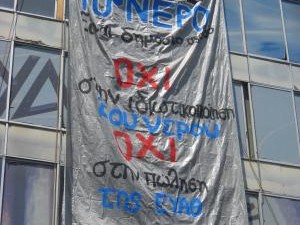
A press release was published recently by Citizens’ Union for Water regarding the latest developments around the ongoing tender for the privatization of EYATH
PRESS RELEASE
Citizens Movement K136 (striving during the last two years against the privatization of the Thessaloniki Water Company – EYATh) and Citizens’ Union for Water ( CUW – a union of the Thessaloniki area Municipality Water Services, established with the assistance of K136 and having as its purpose the acquisition of the majority of EYATh shares) held a press-conference during which they explained their actions up to date as well as their plans for the future.
They explained the legal actions taken after CUW has been excluded from further proceeding in the public tender concerning the sale of EYATh’s shares
They informed the public as to the actions taken up to now by TAIPED 9the institution dealing with the sale of the Greek States private property and they argued that the statements made by TAIPED especially as to the public’s right to water could not be further from the truth
Finally they presented the actions K136 aims to take (locally as well as on a anational and international level) in order for the Greek water services no to be tirned over to private prospectors.
Speakers were Lazaros Angelou, representative of CUW, the environmentalist Dr. Kostas Nikolaou and Kostas marioglou, vice president of the EYATh Workers Union and a member of K136
Issues to be taken into consideration:
Issue 1. As per art. 3 of L 3986/2011: “…TAIPED must serve the public interest”; despite this TAIPED excluded CUW from the public tender. CUW provided the only proposal that serves the public interest.
L 4092/2012 “PrivatizationProgram 2013-2016”
The Hellenic Parliament voted that the Greek State has to surrender all of its rights in a number of companies, organizations, institutions etc. This does not necessarily mean that all these have to be sold/given away to private prospectors as other forms of management are allowed and can prove preferable. CUW’s proposal in the EYATh public tender was the only one that led to the water and sewerage services being managed by the local municipalities and citizen unions. Such management would definitely work for the common good instead having profits as its main target.
Art.1 L 3986/2011: “TAIPED must strive for the best results, … taking into account market issues… and never hide anything from the contestants, the public or other competent authorities…” Despite this, TAIPED three times denied providing CUW the reasons why it has been thrown out of the public tender, which led to CUW applying to Justice in order for the Court to issue a decision forcing TAIPED to provide these (case is to be heard in Athens on 23rd September).
Issue 2. Recently TAIPED officials tried to reassure the public that there will be no danger from the alienation of only the management of water and sewerage services, since the infrastructure as well as the water sources will remain under state control. We all know that private management of water services led to a huge increase in prices in London, Berlin and Paris (to name only the most widely known international examples). We also know that all over Europe municipalities are trying to get water and sewerage services back under control having long suffered under the “advantages” of privatization.
They claim that the management of water and sewerage services requires a high level of know-how which the local municipalities are not able to offer. To prove this they use the financial results of small municipal water enterprises while making no mention of either EYATh or EYDAP (Athens) whose results are much better than those of Suez itself. Everyone able to make a simple addition can discern that with the price demanded by TAIPED the company can be bought by using its net profits during a period smaller than ten years. Mr. Athanasopoulos, chairman of TAIPED, stated: “It was the parliament’s decision, not TAIPED’s, to sell the EYATh shares. We can only advise as to the strategy to be followed. The Government decided that it cannot anymore act as a producer but that it will remain only as a controller and regulator. Still I say the Greek Government has never proved to be effective in such roles”
TAIPED also claims that the state or the municipalities cannot dispose of the capital needed for investments, despite EYATh having spent during the five year period from 2008 till 2012 € 87,9 m to this purpose. But they have still to disclose the investment program to be undertaken by whoever acquires the EYATh shares. And of course the TAIPED CEO (Giannis Emiris) is blatantly lying when he claims that privatization will bring the construction of the Central Sewer’s Second Branch (€ 44 m) and the enlargement of the Purification Installation (€ 36,5 m) as both of these prospects are already running under NSRF.
TAIPED also claims that the new owners of EYATh will not be able to raise the prices at will; Such, for the initial five year period, will be defined through a program to be included in the sale contract; Later these will be controlled by the Special Water Office of the Ministry for Environment, Energy and Climatic Change. They also claim that prices in the future will be lower.
Of course, last January, Athanasopoulos stated (speaking to the parliament); “We will not sale unless the price offered is higher that the provisional value of the total of all future inflows. Emiris added that …”prices for the initial five year period will be known beforehand. These will be determined on the basis of the price the investor (will) pay for buying water, his expenses and his investments plus a certain profit, otherwise there will be no motive for making any investments. We are certain that we will get the best price possible. Of course the price cannot be as high as € 80 m (profits over a 3 year period) as the investor only buys 50% of the company’s shares; most probably it will be something like half of it.”
According to what Athanasopoulos and Emiris said, and expecting that the buyers will invest some € 60 m, depreciated over the same 5-year period and expecting profits of 5%, the Greek public will lose (during same time frame) some € 218: € 179 m shall burden the consumers (based on an average increase of 60%) while the Greek state is going to lose some € 39 m of dividends and income tax. Of course EYATh disposes of some € 33 m in cash and is still owed some € 50 m (by the state and municipalities) of unpaid bills. Giving it to anyone for only € 25 m or so is nothing less than giving it for free.
The Finance Ministry ordained that reimbursement of costs (as it is stated in L 3199/2003) shall be taken into account for setting the price of water services. This reimbursement of costs has been calculated (by a University Team set up to this purpose by the Ministry for Environment, Energy and Climatic Change) at 86,58%, which leads to a further increase in the price of 13,42%.
If the Government insists on selling EYATh the public interest will be served by it being transferred to local municipalities, or citizens’ initiatives or both. The state will collect the sums stated above and (after the initial five years) prices can decrease until they finally cover only the running costs of the enterprise on the basis of a non-profit management.
Issue 3. The great majority of the Thessaloniki inhabitants is against EYATh coming under private control. The Union of Municipalities of Central Macedonia has unanimously declared they stay against EYATh turning to a private enterprise. TheyalsoaskthatEYAThbegiventothemsothattheymanageittothebenefitofthepeopleofThessalonikiandpublicwelfare.
Municipalities who are serviced by EYATh have also declared that they stand for a public referendum in order for the citizens of the area to decide themselves what they want EYATh to become.
The Union of EYATh workers established a citizens’ initiative (named SOS for Water SOS4W). K136 and CUW have been from the start members of this initiative and act in concert with it against the privatization process. “We (SOS4W) say that if the Greek State did not want to have anything to do with water services anymore (and EYATh in particular) they should first have asked the municipalities to take these over. We have already talked that most of the cost for investment during the years to come has been covered by NSRF. We stand together with the municipalities against the privatization of water services and ask for this referendum to be taken. Is anyone afraid of the people expressing their opinion?”
Issue 4 The government (especially through private owned media) claims that transferring the majority of the shares of EYATh has been forced upon them by the Troika (IMF, ECB, EC) and therefore they have no saying on it. Of course no reaction of the government has been recorded yet to commissioner Barnier’s declaration that (quoted) “At no point has the Commission proposed to force or even encourage privatisation of public services such as water. The decision on how to run a public service is in Member States’ hands, and their local authorities. And it will remain that way. …That is why the best solution now appears to be to remove water from the scope of the concessions directive. It is our duty to take into account the concerns expressed by so many citizens.”…
The Greek government also elected to take into account neither the reaction of European citizens against the privatization of water services (more than 1,5 signatures gathered by the relevant ECI) nor the response of commissioner Rehn to EMPs Nikos Houndis and Nikos Chrysogelos that (quoted): … that “the management of water resources is the responsibility of the Member States, so for this reason the commission has taken neutral position on the issue of public or private ownership of water resources, in accordance with Article 345 TFEU, recognizing, at the same time, that “water is a public good which is vital for citizens…. The assets included in the privatization program for the countries of the program is the result of decisions by national authorities alone. The discussions in the adjustment program focus on general funding needs of the program,including privatization revenues from the sale of state assets to investors, but the set up of the privatization program and the selection of assets is the sole responsibility of the Member States “.
Therefore we once more ask the Greek Government to clarify its position vs the above statements in order to withdraw EYATh from its privatization program.
Issue 5 A letter signed by 130 personalities in Greece and abroad as well as 50 EMPs from 18 different countries asks that private prospectors withdraw their offers concerning EYATh in order for the citizens of Thessaloniki to decide themselves what the future of the company shall be. This is also what we ask: the water of Thessaloniki shall be managed by this city’s inhabitants and same shall be done everywhere else in Europe and the world. K136 will continue fighting alongside the European and other citizens’ movements against the privatization of water resources.
We know that the laws and regulations of the European Union forbid monopolies. Therefore we wonder what good does one get if a state monopoly is given to private prospectors. We insist and will never stop to insist that the best way is for non-profit oriented co-operatives to take over the management of water and sewerage. We do wonder how even the most innocent, but by definition profit oriented, private prospector can prove better than these.




